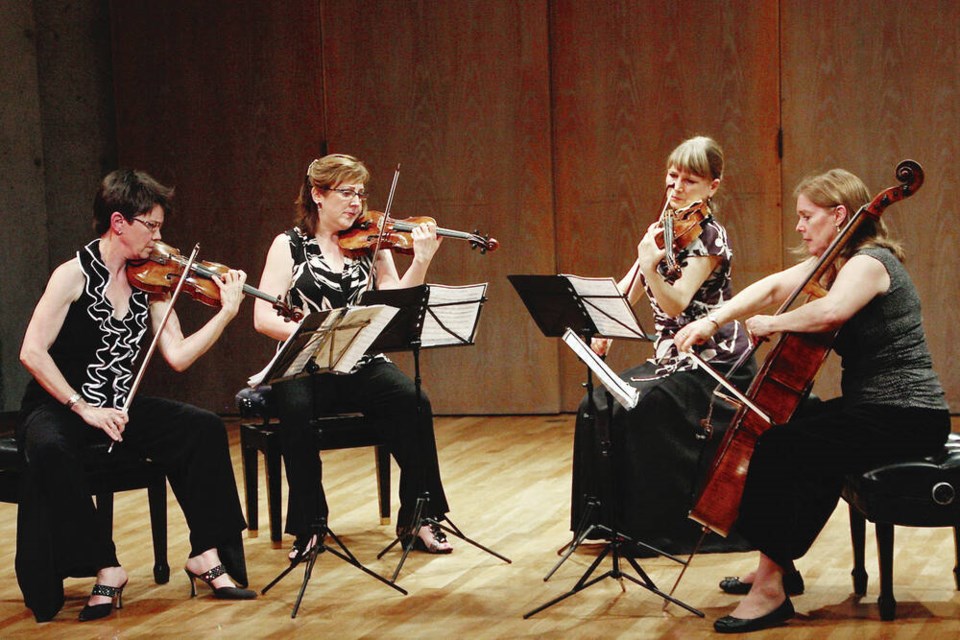Victoria’s Lafayette String Quartet will perform for the last time this weekend, its coda to 37 years as a unit.
Befitting the occasion, the members have chosen to go out with a bang. They wrapped their final swing through Ontario with a series of late-July and early-August concerts, and have performances on tap tonight and Sunday at the University of Victoria’s Phillip T. Young Recital Hall.
The venue was an obvious choice. LSQ have been artists-in-residence at UVic since 1991, and during their time at the university, where they are now associate professors, have trained and mentored more than 400 string musicians. Their legacy at the school includes founding a master’s degree program in string quartet performance, reportedly the only program of its kind in sa国际传媒.
To say the members have been a vital part of the arts and culture community in Greater Victoria is putting it lightly. However, one of the core four, cellist Pamela Highbaugh Aloni, said the quartet has no regrets about disbanding. “It has been a lot, and we’ve done it well. But I think everyone is ready.”
Both farewell concerts are sold out, but tickets are still available for two screenings of Creating Harmony, a new documentary on the group, which will have its world premiere Saturday at UVic’s Cinecenta. An informal Q&A with the filmmakers and Highbaugh Aloni, violinists Ann Elliott-Goldschmid and Sharon Stanis, and violist Joanna Hood will follow each screening.
In the film, much of which was shot in 2017, during their 30th anniversary, the quartet is focused on performances of Shostakovich’s complete cycle of 15 quartets. Arwen Hunter, who directed Creating Harmony, said viewers will get a rare peek into the on-stage and off-stage creative processes — including emotional moments between members — of four decorated musicians.
“We had to convince them to let us to do it,” Hunter said. “They had some trepidation off the top. We really had to earn their trust.”
The film showcases over 50 revealing minutes some of what makes the quartet such a unique entity. The only all-female classical ensemble in the world operating with its founders intact, LSQ has more than 1,000 performances on their résumé, in addition to several studio recordings. That they had to balance a flourishing career with duties at UVic makes the accomplishments all the more impressive.
“We are all very devoted teachers, so we would try to plan touring around reading break, or times like that,” said Highbaugh Aloni, who is head of performance at UVic’s school of music.
“It was extra hard work for us, but it never created difficult feelings anywhere, with students or the faculty. That is part of what [the university] wanted from us as artists-in-residence.”
A quote by Beethoven that will adorn the program at their final concerts this weekend encapsulates the quartet’s relationship. It reads: “Never shall I forget the days I spent with you. Continue to be my friend, as you will always find me yours.”
Musicians who make their living in a group setting need to have a wide and varied set of skills. Talent is a top priority, but it is far from the only factor contributing to long-term success, Highbaugh Aloni said.
“There has to be a willingness to work through the misunderstandings, to listen to each other. You have to be willing to go in there and negotiate.”
Highbaugh Aloni, who has music degrees from Indiana University and California State University, Northridge, knows plenty about group dynamics, having spent 37 years with Elliott-Goldschmid, Stanis and Hood. She admits it will be strange not having daily interactions with her longtime associates.
Stanis will not be returning to UVic and is relocating to Montreal, and the remainder of LSQ will stay on staff at the university.
“There are quartets who continue on with new members, but after all these years together, just the four of us, it seemed like we wanted to land this plane together,” Highbaugh Aloni said.
Each year, LSQ averaged 40 concerts outside Victoria, along with dozens more in Victoria. Balancing the members’ professional careers, school commitments and personal lives wasn’t always easy, but being a diplomatic entity certainly helped.
Highbaugh Aloni pointed to 2001, when she was diagnosed and treated for breast cancer, as a unifying year for the quartet as her recovery meant LSQ would have to cancel a series of scheduled performances. “We had a chance to become the first all-female quartet to play the whole Beethoven cycle in Berlin, and I wanted to put off any treatment so we could still do it,” she said.
Hood, Stanis, and Elliott-Goldschmid made an executive decision, and would not entertain the idea of finding a temporary replacement. They passed on the performances, out of respect for Highbaugh Aloni. It was a gesture she will never forget, well after the buzz of the performances this weekend has faded from memory.
“The team is only as strong as it allows each individual to feel comfortable to be the individual they need to be.”
>>> To comment on this article, write a letter to the editor: [email protected]



